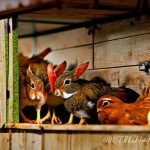Keeping chickens as a vegan presents ethical considerations that require careful examination. Some vegans argue that keeping chickens for eggs constitutes exploitation, while others believe it can be done in alignment with vegan principles. The welfare of the chickens is a primary concern, necessitating a safe and comfortable living environment, a balanced diet, and access to veterinary care.
It is also important to consider the source of the chickens to avoid supporting commercial breeding operations. The decision to keep chickens as a vegan involves weighing these ethical implications and making an informed choice based on personal values and beliefs.
Table of Contents
- 1 Providing a balanced and nutritious diet for chickens without using animal products
- 2 Creating a safe and comfortable living environment for chickens
- 3 Alternative methods for pest control and disease prevention
- 4 Building a relationship with chickens based on respect and understanding
- 5 Finding sustainable and cruelty-free sources for chicken feed and bedding
- 6 Supporting rescue and sanctuary organizations for chickens
- 7 FAQs
- 7.1 What does it mean to keep chickens as a vegan?
- 7.2 What are some reasons why a vegan might want to keep chickens?
- 7.3 How can a vegan keep chickens without exploiting them?
- 7.4 What are some ethical considerations for vegans who want to keep chickens?
- 7.5 What are some alternatives to keeping chickens for eggs?
Key Takeaways
- Keeping chickens as a vegan raises ethical considerations regarding the use of animals for personal benefit
- A balanced and nutritious diet for chickens can be provided without using animal products, through a variety of plant-based options
- Creating a safe and comfortable living environment for chickens is essential for their well-being, including access to clean water, shelter, and space to roam
- Alternative methods for pest control and disease prevention can be implemented, such as natural repellents and regular health checks
- Building a relationship with chickens based on respect and understanding involves observing their behavior and responding to their needs
- Finding sustainable and cruelty-free sources for chicken feed and bedding supports ethical practices and reduces environmental impact
- Supporting rescue and sanctuary organizations for chickens can help provide a safe and loving environment for those in need
Providing a balanced and nutritious diet for chickens without using animal products
Providing a balanced and nutritious diet for chickens without using animal products is essential for their health and well-being. Chickens require a diet that is high in protein, vitamins, and minerals to support their growth, egg production, and overall health. Fortunately, there are many plant-based options available to meet their nutritional needs.
Legumes, such as soybeans and lentils, are excellent sources of protein for chickens. Additionally, grains like corn, wheat, and oats can provide essential carbohydrates for energy. Fruits and vegetables can also be included in their diet to provide vitamins and minerals.
It is important to ensure that the chickens have access to fresh water at all times to prevent dehydration. By carefully selecting and combining plant-based ingredients, it is possible to provide a balanced and nutritious diet for chickens without using animal products. Providing a balanced and nutritious diet for chickens without using animal products is essential for their health and well-being.
Chickens require a diet that is high in protein, vitamins, and minerals to support their growth, egg production, and overall health. Fortunately, there are many plant-based options available to meet their nutritional needs. Legumes, such as soybeans and lentils, are excellent sources of protein for chickens.
Additionally, grains like corn, wheat, and oats can provide essential carbohydrates for energy. Fruits and vegetables can also be included in their diet to provide vitamins and minerals. It is important to ensure that the chickens have access to fresh water at all times to prevent dehydration.
By carefully selecting and combining plant-based ingredients, it is possible to provide a balanced and nutritious diet for chickens without using animal products.
Creating a safe and comfortable living environment for chickens

Creating a safe and comfortable living environment for chickens is essential for their well-being. Chickens require shelter that protects them from predators, extreme weather conditions, and provides them with a sense of security. A well-ventilated coop with proper insulation can help regulate temperature and prevent respiratory issues.
Additionally, providing roosting bars and nesting boxes will give the chickens a place to rest and lay eggs comfortably. It is important to keep the living area clean by regularly removing waste and providing fresh bedding made from natural materials such as straw or wood shavings. Outdoor access is also important for chickens to engage in natural behaviors such as scratching, dust bathing, and foraging.
By creating a safe and comfortable living environment, chickens can thrive and lead happy lives. Creating a safe and comfortable living environment for chickens is essential for their well-being. Chickens require shelter that protects them from predators, extreme weather conditions, and provides them with a sense of security.
A well-ventilated coop with proper insulation can help regulate temperature and prevent respiratory issues. Additionally, providing roosting bars and nesting boxes will give the chickens a place to rest and lay eggs comfortably. It is important to keep the living area clean by regularly removing waste and providing fresh bedding made from natural materials such as straw or wood shavings.
Outdoor access is also important for chickens to engage in natural behaviors such as scratching, dust bathing, and foraging. By creating a safe and comfortable living environment, chickens can thrive and lead happy lives.
Alternative methods for pest control and disease prevention
When keeping chickens, it is important to use alternative methods for pest control and disease prevention that do not harm the environment or pose risks to the chickens’ health. Natural pest control methods such as diatomaceous earth can be used to control parasites like mites and lice without the use of harmful chemicals. Additionally, maintaining good hygiene practices by regularly cleaning the coop and providing clean bedding can help prevent the spread of diseases.
It is also important to monitor the chickens’ health regularly and seek veterinary care if any signs of illness are observed. By using alternative methods for pest control and disease prevention, it is possible to maintain a healthy environment for the chickens without compromising their well-being. When keeping chickens, it is important to use alternative methods for pest control and disease prevention that do not harm the environment or pose risks to the chickens’ health.
Natural pest control methods such as diatomaceous earth can be used to control parasites like mites and lice without the use of harmful chemicals. Additionally, maintaining good hygiene practices by regularly cleaning the coop and providing clean bedding can help prevent the spread of diseases. It is also important to monitor the chickens’ health regularly and seek veterinary care if any signs of illness are observed.
By using alternative methods for pest control and disease prevention, it is possible to maintain a healthy environment for the chickens without compromising their well-being.
Building a relationship with chickens based on respect and understanding
Building a relationship with chickens based on respect and understanding is essential for creating a harmonious environment. Chickens are intelligent animals with unique personalities, and they thrive in environments where they feel safe and secure. Spending time with the chickens, observing their behavior, and understanding their needs can help foster a strong bond based on trust and mutual respect.
Providing enrichment activities such as toys or treats can also help strengthen the relationship between humans and chickens. It is important to approach interactions with chickens with patience and empathy, allowing them to express their natural behaviors without interference. By building a relationship based on respect and understanding, it is possible to create a positive environment where both humans and chickens can coexist peacefully.
Building a relationship with chickens based on respect and understanding is essential for creating a harmonious environment. Chickens are intelligent animals with unique personalities, and they thrive in environments where they feel safe and secure. Spending time with the chickens, observing their behavior, and understanding their needs can help foster a strong bond based on trust and mutual respect.
Providing enrichment activities such as toys or treats can also help strengthen the relationship between humans and chickens. It is important to approach interactions with chickens with patience and empathy, allowing them to express their natural behaviors without interference. By building a relationship based on respect and understanding, it is possible to create a positive environment where both humans and chickens can coexist peacefully.
Finding sustainable and cruelty-free sources for chicken feed and bedding

Sourcing Plant-Based Feed
There are many options available for sourcing plant-based feed that meets the nutritional needs of chickens without relying on animal products. Additionally, seeking out organic or locally grown feed can help reduce environmental impact while supporting sustainable agriculture practices.
Choosing Natural Bedding Materials
When it comes to bedding materials, choosing natural options such as straw or wood shavings from sustainable sources can help minimize environmental harm while providing comfort for the chickens.
Upholding Vegan Values
By carefully selecting sustainable and cruelty-free sources for chicken feed and bedding, it is possible to uphold vegan values while meeting the needs of the chickens.
Supporting rescue and sanctuary organizations for chickens
Supporting rescue and sanctuary organizations for chickens is an important way to contribute to the well-being of these animals while upholding vegan values. Many organizations provide care for rescued or abandoned chickens, offering them a safe haven where they can live out their lives free from harm. By volunteering time or donating resources to these organizations, individuals can make a positive impact on the lives of chickens in need.
Additionally, supporting advocacy efforts aimed at improving welfare standards for farmed animals can help create long-term change within the industry. By actively supporting rescue and sanctuary organizations for chickens, individuals can align their actions with their vegan values while making a meaningful difference in the lives of these animals. Supporting rescue and sanctuary organizations for chickens is an important way to contribute to the well-being of these animals while upholding vegan values.
Many organizations provide care for rescued or abandoned chickens, offering them a safe haven where they can live out their lives free from harm. By volunteering time or donating resources to these organizations, individuals can make a positive impact on the lives of chickens in need. Additionally, supporting advocacy efforts aimed at improving welfare standards for farmed animals can help create long-term change within the industry.
By actively supporting rescue and sanctuary organizations for chickens, individuals can align their actions with their vegan values while making a meaningful difference in the lives of these animals. In conclusion, keeping chickens as a vegan requires careful consideration of ethical implications while ensuring that their needs are met in a compassionate manner. By providing a balanced diet without using animal products, creating a safe living environment, using alternative methods for pest control and disease prevention, building respectful relationships with the animals, sourcing sustainable feed and bedding materials, and supporting rescue organizations, it is possible to keep chickens in alignment with vegan values while promoting their well-being.
Ultimately, by approaching chicken keeping with empathy, respect, and understanding, individuals can create positive environments where both humans and animals can thrive together in harmony.
If you’re interested in keeping chickens as a vegan, you may also want to consider raising quail. Quail are smaller and require less space and resources than chickens, making them a great option for those who want to minimize their impact on animal agriculture. You can learn more about what vegetables quail eat in this informative article on PoultryWizard.
FAQs
What does it mean to keep chickens as a vegan?
Keeping chickens as a vegan means providing care and shelter for chickens without exploiting them for their eggs or meat. This includes providing a safe and comfortable environment, proper nutrition, and medical care for the chickens.
What are some reasons why a vegan might want to keep chickens?
Some vegans may choose to keep chickens as a way to provide sanctuary for rescued or abandoned chickens, to educate others about the ethical treatment of animals, or to enjoy the companionship of chickens without exploiting them for their eggs or meat.
How can a vegan keep chickens without exploiting them?
Vegans can keep chickens without exploiting them by providing a safe and comfortable environment, feeding them a balanced diet, and refraining from collecting or consuming their eggs. Additionally, vegans can prioritize the well-being and happiness of the chickens, rather than using them for their products.
What are some ethical considerations for vegans who want to keep chickens?
Vegans who want to keep chickens should consider the ethical implications of their actions, including the potential for exploitation and the well-being of the chickens. It’s important to prioritize the chickens’ needs and ensure that they are not being used for their eggs or meat.
What are some alternatives to keeping chickens for eggs?
Vegans who want to enjoy egg-like dishes can explore plant-based alternatives such as tofu, chickpea flour, or commercial egg substitutes. These alternatives provide a cruelty-free option for those who want to avoid exploiting chickens for their eggs.
Meet Walter, the feathered-friend fanatic of Florida! Nestled in the sunshine state, Walter struts through life with his feathered companions, clucking his way to happiness. With a coop that’s fancier than a five-star hotel, he’s the Don Juan of the chicken world. When he’s not teaching his hens to do the cha-cha, you’ll find him in a heated debate with his prized rooster, Sir Clucks-a-Lot. Walter’s poultry passion is no yolk; he’s the sunny-side-up guy you never knew you needed in your flock of friends!







